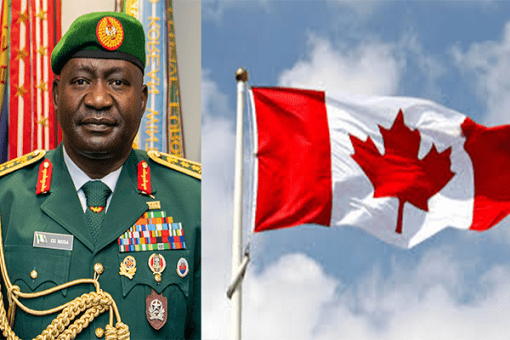The recent denial of visas by the Canadian Embassy to Nigeria’s Chief of Defence Staff (CDS), General Christopher Musa, and other top military officials has sparked widespread reactions, ranging from diplomatic concerns to outright condemnation by government officials and political figures.
The visa denial and its immediate impact
According to a report by Channels Television, General Musa disclosed the visa denial at the maiden annual lecture of the National Association of the Institute for Security Studies (AANISS) in Abuja. The CDS and his team were scheduled to attend an event in Canada honoring war veterans, including Nigerian soldiers injured in battles. While some members of the delegation were granted visas, others, including General Musa, were denied entry.
Expressing his disappointment, General Musa remarked, “Yesterday, I was meant to be in Canada. There’s an event to honor our veterans, those that were injured during battles, and we were meant to be there. We were invited with our team. Half has gone and half has been denied.”
This revelation has since ignited a heated debate on diplomatic relations between Nigeria and Canada, with various officials expressing their views on the matter.
Government Officials React
The Nigerian Minister of Interior, Olubunmi Tunji-Ojo, strongly condemned the visa denial, describing it as disrespectful to Nigeria.
Speaking on Channels Television’s program, Sunrise Daily, Tunji-Ojo questioned the rationale behind Canada’s decision and expressed concerns over the treatment of ordinary Nigerian applicants at the embassy.
“As much as we don’t want to dabble into another country’s sovereignty, the issue of visas and migration management is a sovereign matter. However, I see it as a disrespect, not just to the Chief of Defence Staff, but to Nigeria as a whole. If this can happen to a top government official, then I am worried about what happens to an average Nigerian seeking a visa,” he said.
Tunji-Ojo also emphasized that if there were any concerns about the delegation, they could have been addressed through diplomatic back channels rather than outright rejection. He expressed confidence that the Ministry of Foreign Affairs would intervene to resolve the matter.
Similarly, National Security Adviser (NSA) Nuhu Ribadu reacted with strong words, criticizing Canada’s action as a slight against Nigeria.
Speaking at the same AANISS event, Ribadu bluntly stated, “Canada can go to hell.”
He went on to stress that Nigeria must strive to build itself into a strong and self-reliant nation to avoid being treated with disrespect on the global stage. “Even though it’s painful, it’s disrespectful, but we are peaceful and strong. I agree that it is time to fix our country. Yet, this is another reason we work hard to make Nigeria work,” Ribadu said, as reported by The Nation Newspaper.
Possible diplomatic misstep behind the denial
However, despite the outcry, emerging reports suggest that the visa denial may have resulted from a diplomatic oversight. According to a report by The Nation Newspaper, top government sources indicated that the affected officers applied for Canadian visas without a Note Verbale—a formal diplomatic communication from Nigeria’s Ministry of Foreign Affairs.
“There was a diplomatic error on the part of desk officers who handled the CDS and others’ visa applications. There was no Note Verbale from the Ministry of Foreign Affairs, contrary to existing protocol for any trip by high-ranking government officials,” a source told The Nation.
The source added that the Nigerian government had since engaged Canadian officials to rectify the situation. “There is no diplomatic issue with Canada; we are only trying to get a few things right,” the source explained.
Political and public reactions
The controversy has also drawn reactions from political figures, including former Minister of Aviation, Femi Fani-Kayode. In a statement on his X (formerly Twitter) account, he praised Ribadu for his strong response, stating, “At last, we now have an NSA that has some balls and is prepared to stand up to foreigners that treat our people with contempt.”
He further criticized Canada, saying, “They should not only ‘go to hell’ but also go and jump in the lagoon. Nigeria has paid her dues and MUST be treated with respect,” as reported by The Nation Newspaper.
However, not all Nigerian leaders supported the aggressive stance taken by some government officials. According to a report by The Guardian Newspaper, former Jigawa State Governor Sule Lamido criticized NSA Ribadu’s public outburst, describing it as a diplomatic blunder that could damage Nigeria’s international reputation.
Lamido, who previously served as Minister of Foreign Affairs, argued that the matter should have been handled more professionally through diplomatic channels. “The whole blunder could have been avoided if the Ministry of Foreign Affairs were allowed to play their role as the key ministry in guiding our conduct on the global stage,” he said.
He further emphasized that instead of public confrontation, the appropriate response should have been to summon the Canadian High Commissioner for diplomatic talks. “The NSA should not and must not appropriate the duties of the Minister of Foreign Affairs,” he warned, urging a more strategic approach to Nigeria’s diplomatic engagements.









